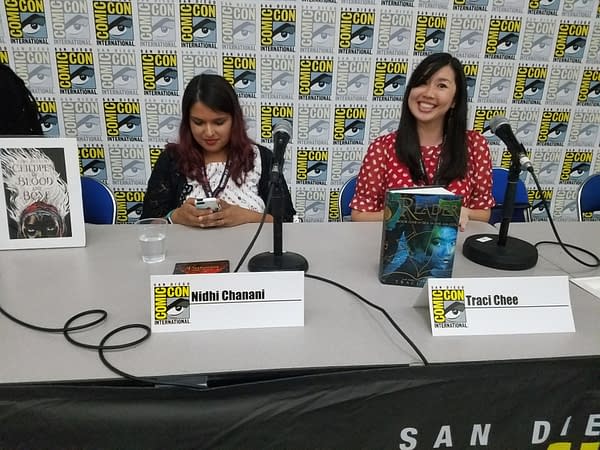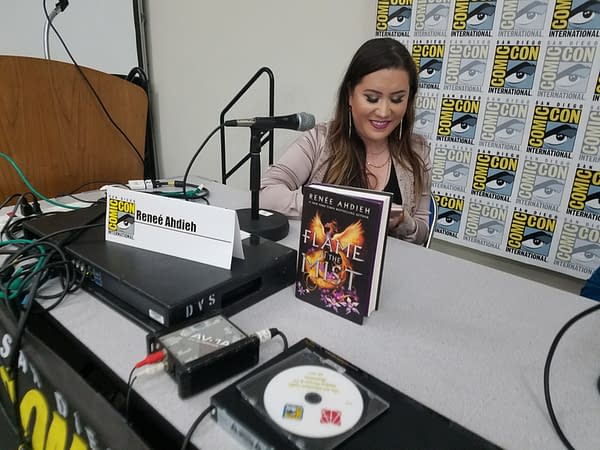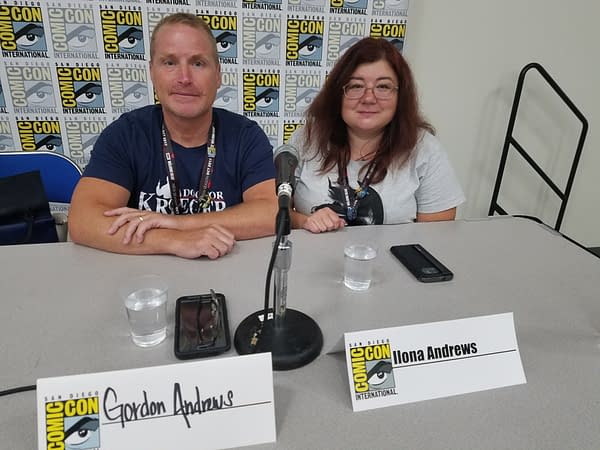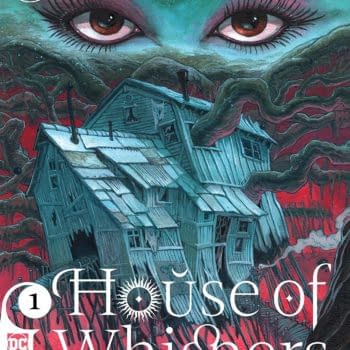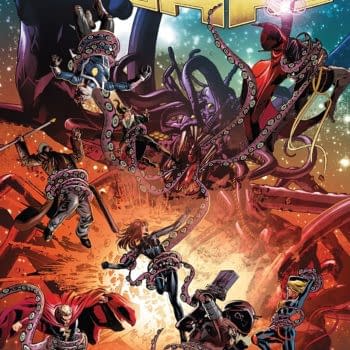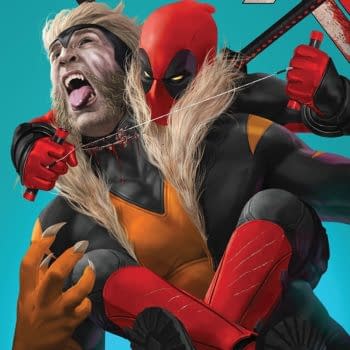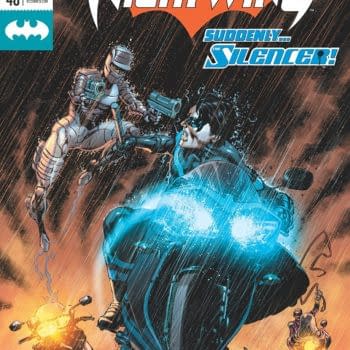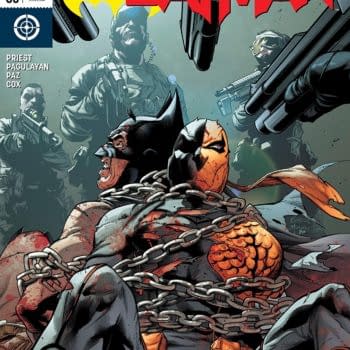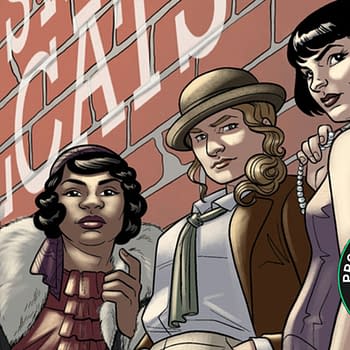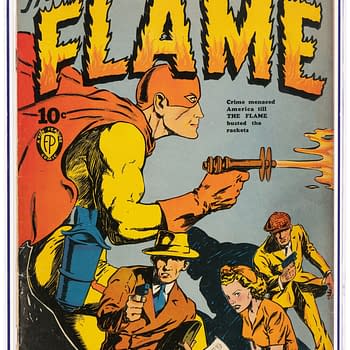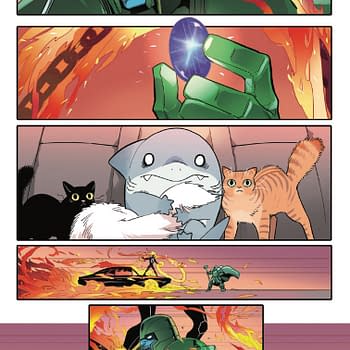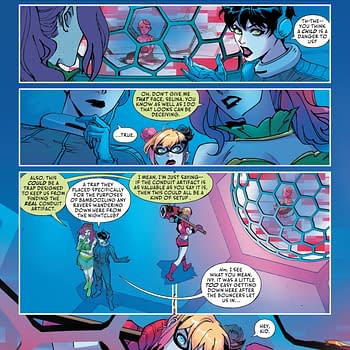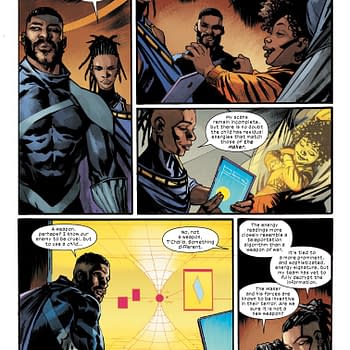Posted in: Books, Comics | Tagged: andrew gordan, children of blood and bone, City of Brass, fiction, flame in the mist, HRL, ilona andrews, ilona gordan, nidhi chanani, novels, pashmina, s. a. chakraborty, sdcc, the speaker, tomi adeyemi, traci chee, Wildfire, world mythology in contemporary fantasy, YA novels
SDCC World Mythology In Contemporary Fantasy Panel: Building Worlds And Gunplay
Courtesy of Bleeding Cool's Hilton Collins:
According to Tomi Adeyemi, the Nigerian-American author of the young adult fantasy novel Children of Blood and Bone, fiction readers love learning about new worlds in stories, and aspiring writers shouldn't shy away from creating complex rules about their burgeoning fictional universes. "Readers want stories they can learn from. [They] don't want baby food, so it's okay to throw a bunch of new things at them."
She and several other fantasy creators gave attendees advice on building fantasy worlds in their stories. San Diego Comic-Con's Saturday afternoon panel World Mythology in Contemporary Fantasy featured multiple storytellers with a bevy of knowledge. Renee Ahdieh (Flame in the Mist) moderated Adeyemi and other panelists, Traci Chee (The Speaker), S. A. Chakraborty (The City of Brass), Nidhi Chanani (Pashmina), and the husband-and-wife team of Ilona Gordon and Andrew Gordon, who use the nom de plume Ilona Andrews (Wildfire).
Adeyemi said that creators should start building worlds with things they're interested in. "You start with the most fun part and get that all on the page or a Post-It note or white board," she said. "Once you have all the fun parts, the creative inspiration, that's when you start to add the logic."
Ahdieh likes to include sensory details that writers often overlook. For example, novels are replete with descriptions of things that characters see and hear, but she remembers to include taste and smell. "That's where I begin when I'm world building."
But none of it matters if there's no conflict between characters, in Ilona Gordon's opinion. World-building is an excellent opportunity to create opposing groups of people with grudges, rivalries, and competing goals. "Factions create conflict, and conflict is where stories come from," she said.
She offered multiple examples, to humorous effect, like ninjas vs. pirates, werewolves vs. pirates, and even black kitties vs. white kitties.
Magic and mysticism's at the heart of fantasy, but we don't have spells in the real world. The goal for storytellers is making fantastical elements digestible for readers.
Chanani, the only visual artist on the panel, used color in her illustrations to highlight differences between real world and make-believe. In one of her projects, she illustrated the reality pages in black-and-white, and the fantasy pages are in full color. "I bring you in with color. It's really easy to do because it's seductive and pretty," she said. "It's physically creating a lens through which your readers can experience the magic."
Exploring myth, magic, and deities was exactly what inspired Adeyemi to start writing her stories to begin with. She was in Brazil doing research for a project she didn't name, and she discovered figures of West African gods and goddesses, and she was mesmerized:
"I thought, 'This looks like African The Last Airbender. What is this?' I wanted to build a fantasy system around these gods and goddesses that I'd never seen. Also, as a black person, I didn't know black gods and goddesses existed. I was like, 'A lot of people need to know about this.'"
Pretty much every panelist agreed that research is essential to cultural fantasy. Studying history is a requirement to get the facts straight, even if a writer intends to bend the facts for a narrative.
Chakraborty had a leg up on her fellow storytellers, since she's studied history. "I studied history for 10 years and now I cheat and just add magic to things I like," she joked. Yet on a more serious note, she emphasized maintaining the integrity of characters' emotions throughout:
"This is important for world building, not losing your characters' humanity. We're all genre fans. We love political intrigue, and we love the elements of somebody fighting against the man, but how does it feel to do that? We have things like Game of Thrones and everything, but what does it feel like to rebel against your father? We have families. These are emotions that people really have."
Adeyemi's enthusiastic about crafting origin stories for her fiction, and she researches world myths and legends to help with the process — even from other fiction writers, saying:
"I have to start at the beginning and say, 'All right, how did this world even come into existence?'I like to, when I'm reading books, see what they do, and then I'm like, 'Okay, how did this world come to be? Who put it into being? What were the first civilizations?'"
However, Chee stressed the importance of rules in fiction. Writers should operate within boundaries when crafting their worlds and researching the foundations. "To make a world feel real there has to be consequences for every action. Sort of a balance for the amazing things that people can do," she said. "Having the balance for a magic system, for example, or a political system, [it's] very important to keep those rules consistent."
The panelists have spent a lot of time researching throughout their careers, but sometimes their journeys for knowledge have led them to strange misadventures. At times they've even been so preoccupied with research efforts that they weren't concentrating on more immediate tasks, which led to disaster.
"The worst story of research that I've ever done is, I set fire to my kitchen trying to learn how to make Persian rice," Ahdieh sid. "I'm very dedicated when it comes to food, and weaponry."
In her upcoming sequel to City of Brass, she has a scene where a character picks a lock with a miswak stick, which is a stick people use to pick their teeth in the Middle East. She wanted to see if that was feasible in real-life, so she actually tried to pick a lock with a real miswak stick.
"I was in my apartment, got a miswak stick, and I got a lock and I tried to see if I could pick it," she said. Unfortunately, the stick wasn't up to the task. "It was a little too soft."
Chee loves writing about the ocean, and in her upcoming book The Speaker, she'll have characters who are cowboy pirates. She visited all kinds of ships and related artifacts for study — docked ships, ships at sea, museums — and it was a rewarding experience. However, she thinks it's ironic that she's so involved with ocean-based fiction because she gets sea sick in real life.
"I throw up immediately," Chee said. "I feel ashamed writing these cowboy pirates having these grand adventures."
Good research saved writers from making egregious factual inaccuracies in their prose. The Andrews's found this out the hard way. Wildfire's part of the Hidden Legacy trilogy, and it involves gunplay, so their characters pack heat. Sadly though, the descriptions of the guns in their stories haven't always been correct, and readers have called them on it.
Initially, their editor raised concerns that too many characters used Sig Sauers. The Andrews's solved the problem by switching some of the guns to Glocks, but they created a new problem for themselves. The Sig Sauer has an external safety, but a Glock doesn't, and the Andrews's didn't know, so they accidentally put a mistake in their book.
The error prompted someone from the Houston PD to email the Andrews's to notify them of their mistake.
Ilona Gordon read an excerpt from the letter to the audience:
"'Dear Ilona Andrews, I work for Houston PD cold case files. We very much enjoy your book. We all read it. However, Glock has no external safety,'" Gordon said, and many audience members laughed. "And then [it was] a long discussion of why we're stupid. 'In conclusion, if you ever need help with some research, Houston PD cold case files will help you.'"


